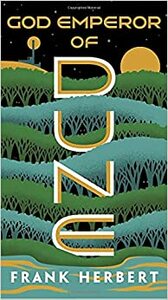Take a photo of a barcode or cover
adventurous
challenging
dark
emotional
mysterious
reflective
sad
tense
medium-paced
Plot or Character Driven:
A mix
Strong character development:
Yes
Loveable characters:
Complicated
Diverse cast of characters:
Yes
Flaws of characters a main focus:
Yes
My favorite book after the original Dune, it was very engaging and easier to understand for me. I was a Leto hater at the beginning but he came around at the end, too :)
challenging
mysterious
reflective
slow-paced
Plot or Character Driven:
Character
Strong character development:
Yes
Loveable characters:
Complicated
Diverse cast of characters:
Yes
Flaws of characters a main focus:
Yes
adventurous
challenging
mysterious
reflective
tense
slow-paced
Plot or Character Driven:
Character
Strong character development:
Yes
Loveable characters:
Complicated
Diverse cast of characters:
No
Flaws of characters a main focus:
Yes
What a freaking ride.
challenging
emotional
funny
reflective
slow-paced
Plot or Character Driven:
Character
Strong character development:
Complicated
Loveable characters:
Yes
Diverse cast of characters:
Yes
Flaws of characters a main focus:
Yes
Frank Herbert’s God Emperor of Dune is a bold philosophical fable hidden within a science fiction epic. For readers expecting another space opera, this fourth installment might feel jarringly introspective. But for those attuned to Herbert’s deeper rhythms—fans of Nietzsche, Zen Buddhism, Heidegger, and mythic transformation—this is some of his most brilliant, challenging, and strangely funny work.
Set 3,500 years after Children of Dune, the book centers around Leto II Atreides, who has fused with a sandworm to become a near-immortal hybrid—half man, half beast, and all emperor. His transformation is more than physical: it is the embodiment of a philosophy. Leto has sacrificed his humanity to enforce the Golden Path—a millennia-long strategy to preserve the future of humanity by denying it comfort, predictability, and easy answers.
The Kafka comparison is unavoidable: like Gregor Samsa waking up as an insect, Leto’s transformation is a grotesque metaphor for alienation—but unlike Kafka’s passive absurdity, Leto chooses his metamorphosis. His tyranny is rooted in purpose. Herbert asks: What if the only way to free humanity from its destructive cycles was through a despot who loved it enough to be hated?
Leto becomes a living contradiction—both god and prisoner, savior and tyrant. His rule is built on ritual, myth, and surveillance, echoing real-world theocracies and empires. Sometimes the most powerful revolt is to live on your own terms, unseen and unaccounted for by the powers that be. This maxim, whispered beneath the grandeur of Leto’s empire, feels like the true heartbeat of the book. He is deliberately pushing humanity to wake up, rekindle their fires, and become their own masters of themselves.
Themes of memory, fate, religion, and power run deep. Herbert draws on Nietzsche’s idea of the eternal return, Heidegger’s concept of being-toward-death, and Zen detachment from the self. Leto warns of rhetorical despotism and the seductions of certainty. The Bene Gesserit, the Ixians, the Fish Speakers—all orbit his slow-burning philosophy like sparks against a bonfire.
And yet, the prose never bogs. Herbert’s writing here is some of his best: clever, sarcastic, elegantly crafted without sacrificing clarity. The dialogue between Leto and his companions is often sharp, humorous, and haunting.
This isn’t a novel you “finish.” It lingers. It reshapes how you view power, history, and the self. Leto may have surrendered his humanity, but Herbert never lets us forget what it means to be human.
Set 3,500 years after Children of Dune, the book centers around Leto II Atreides, who has fused with a sandworm to become a near-immortal hybrid—half man, half beast, and all emperor. His transformation is more than physical: it is the embodiment of a philosophy. Leto has sacrificed his humanity to enforce the Golden Path—a millennia-long strategy to preserve the future of humanity by denying it comfort, predictability, and easy answers.
The Kafka comparison is unavoidable: like Gregor Samsa waking up as an insect, Leto’s transformation is a grotesque metaphor for alienation—but unlike Kafka’s passive absurdity, Leto chooses his metamorphosis. His tyranny is rooted in purpose. Herbert asks: What if the only way to free humanity from its destructive cycles was through a despot who loved it enough to be hated?
Leto becomes a living contradiction—both god and prisoner, savior and tyrant. His rule is built on ritual, myth, and surveillance, echoing real-world theocracies and empires. Sometimes the most powerful revolt is to live on your own terms, unseen and unaccounted for by the powers that be. This maxim, whispered beneath the grandeur of Leto’s empire, feels like the true heartbeat of the book. He is deliberately pushing humanity to wake up, rekindle their fires, and become their own masters of themselves.
Themes of memory, fate, religion, and power run deep. Herbert draws on Nietzsche’s idea of the eternal return, Heidegger’s concept of being-toward-death, and Zen detachment from the self. Leto warns of rhetorical despotism and the seductions of certainty. The Bene Gesserit, the Ixians, the Fish Speakers—all orbit his slow-burning philosophy like sparks against a bonfire.
And yet, the prose never bogs. Herbert’s writing here is some of his best: clever, sarcastic, elegantly crafted without sacrificing clarity. The dialogue between Leto and his companions is often sharp, humorous, and haunting.
This isn’t a novel you “finish.” It lingers. It reshapes how you view power, history, and the self. Leto may have surrendered his humanity, but Herbert never lets us forget what it means to be human.
challenging
dark
emotional
inspiring
reflective
sad
slow-paced
Plot or Character Driven:
Character
Strong character development:
Yes
Loveable characters:
Yes
Diverse cast of characters:
Yes
Flaws of characters a main focus:
Yes
dark
mysterious
reflective
tense
slow-paced
Plot or Character Driven:
A mix
Strong character development:
Yes
Loveable characters:
Yes
Diverse cast of characters:
Yes
Flaws of characters a main focus:
Yes
challenging
reflective
medium-paced
Plot or Character Driven:
Plot
Strong character development:
Complicated
Loveable characters:
No
Diverse cast of characters:
Complicated
Flaws of characters a main focus:
Yes
Ook het 4e deel was werkelijk prachtig! Ook weer op een hele andere manier geschreven dan de eerste 3, dat laat ook weer zien wat voor woorden meester Frank Herbert eigenlijk was. Heel erg van genoten, op naar deel 5!
dark
emotional
mysterious
reflective
sad
tense
medium-paced
Plot or Character Driven:
A mix
Strong character development:
Yes
Loveable characters:
Complicated
Diverse cast of characters:
Yes
Flaws of characters a main focus:
Yes
Finishing God Emperor of Dune felt like staring directly at the sun. I fully intended to keep reading the series, but this one left me so rattled I had to take a multi-year hiatus to process everything.
dark
reflective
medium-paced
Plot or Character Driven:
Character








